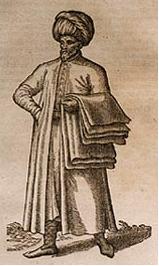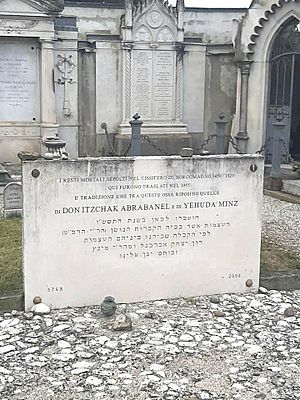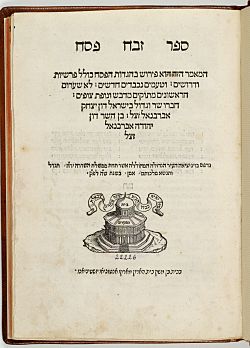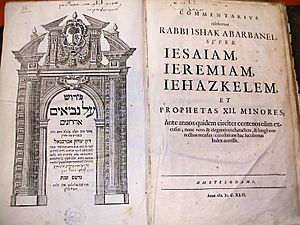Isaac Abarbanel facts for kids
Quick facts for kids
Don Isaac Abarbanel
|
|
|---|---|

Isaac Abarbanel, 16th century depiction
|
|
| Born |
Isaac ben Judah Abarbanel
1437 |
| Died | 1508 (aged 70–71) |
| Era | Medieval philosophy |
| Region | Jewish philosophy |
|
Main interests
|
Religious philosophy |
Isaac ben Judah Abarbanel (Hebrew: יצחק בן יהודה אברבנאל; 1437–1508), often called Abarbanel, was an important Portuguese Jewish leader. He was a statesman, a deep thinker (a philosopher), a Bible commentator, and a financier (someone who manages large sums of money). He is also known by the names Abravanel, Avravanel, or Abrabanel.
Contents
About His Life and Work
Early Life and Career in Portugal
Isaac Abarbanel was born in Lisbon, Portugal, in 1437. His family, the Abravanels, was one of the oldest and most respected Jewish families from the Iberian Peninsula (Spain and Portugal). They had moved to Portugal after difficulties in Castile in 1391.
From a young age, Isaac was very smart. He studied rabbinic literature (Jewish religious texts) and many other subjects of his time. He was also very good with money and finances. This skill caught the attention of King Afonso V of Portugal, who hired him as his treasurer, a very important financial role.
Abarbanel used his high position and the wealth he inherited to help other Jewish people. For example, when King Afonso captured the city of Arzila in Morocco, many Jewish captives were in danger of being sold as slaves. Abarbanel gave a lot of his own money to free them. He also organized collections of money from Jewish communities across Portugal.
Moving to Spain and Challenges
After King Afonso V died, Isaac Abarbanel faced problems. The new king, John II of Portugal, accused him of being involved with the Duke of Braganza. Abarbanel was warned and quickly fled to Castile, Spain, in 1483 to save himself. The king then took all of Abarbanel's large fortune.
In Toledo, his new home, Abarbanel first focused on studying the Bible. In just six months, he wrote a long commentary on the books of Joshua, Judges, and Samuel. Soon after, he began working for the Spanish royal family. He and his friend, Don Abraham Senior, helped manage the royal army's finances and supplies for Queen Isabella I of Castile.
During the war against the Moors, Abarbanel lent large amounts of money to the king. However, in 1492, the Catholic Monarchs of Spain ordered all Jews to leave Spain with the Alhambra Decree. Abarbanel tried everything to convince the king to change his mind. He even offered a huge sum of money, but it was not accepted. He had to leave Spain with his fellow Jews.
Later Years and Legacy
Abarbanel then traveled to Naples, Italy, where he again worked for the king. But when the French army took the city, he lost everything and had to move again. He lived in Messina, Corfu, Monopoli, and finally settled in Venice in 1503. In Venice, he helped negotiate a trade agreement between Portugal and the Venetian Republic.
Isaac Abarbanel died in Venice in 1508. He was buried in Padua next to another important rabbi, Judah Minz. Sadly, the Jewish cemetery there was destroyed during a war in 1509, so his exact grave is now unknown. Some of the bones from the cemetery were reburied in 1955, and it is believed that Abarbanel's remains might be among them.
Abarbanel's legacy lives on. For example, the Synagogue Don Isaac Abravanel in Paris, France, is named in his honor.
His Writings
Abarbanel wrote many books. They are usually divided into three main types:
- Exegesis: Explaining the Bible.
- Philosophy: Discussing deep ideas, especially how science relates to Jewish religion.
- Apologetics: Defending Jewish beliefs, like the idea of the Messiah in Judaism.
Abarbanel's writings were unique because he considered the social and political issues of his time when explaining the Bible. He believed that understanding the real lives of Jewish people was important when discussing such a holy text. He also wrote introductions to each book he commented on, explaining its purpose and when it was written, to help regular readers.
Bible Commentaries (Exegesis)
Abarbanel wrote detailed commentaries on the Torah (the first five books of the Bible) and the Nevi'im (the Prophets). These were published in several works, including "Perush" (Commentary) on the Torah and the Prophets.
His commentaries are organized into chapters, each starting with a list of questions he planned to answer. This made it easier for students to study his work. He usually focused on the meaning of the text rather than just grammar.
Abarbanel often connected the social structures of biblical times to those of Europe in his own day. For instance, he compared the ancient institution of monarchy (kingship) to the monarchies of his time. He also looked at Christian explanations of the Bible, often disagreeing with them, but sometimes using their ideas if he found them helpful.
A major goal of Abarbanel's Bible commentaries was to give hope to the Jewish people, especially after they were expelled from Spain. He often suggested that the arrival of the Messiah was near.
Philosophical Works
Abarbanel was generally against some philosophical ideas that he felt might weaken the faith of ordinary Jewish people. His most important religious work is Rosh Amanah (The Pinnacle of Faith). In this book, he defended the 13 main principles of Jewish belief, which were outlined by Maimonides, another famous Jewish thinker.
He believed that the teachings of the Torah were direct revelations from God and that all parts of the Torah were equally important. He also disagreed with Maimonides' idea that prophetic visions were just creations of imagination. Abarbanel believed that God made these visions and voices real.
Works on the Messiah (Apologetics)
Abarbanel deeply understood the sadness and hopelessness that many Spanish Jews felt after being forced to leave their homes. To help them, he wrote several books to strengthen their belief in the coming of the Messiah. These works include:
- "The Wellsprings of Salvation" (Maʿyānei haYəshuʿāh, 1496), which explains the Book of Daniel.
- "The Salvation of His Anointed" (Yəshuʿot Meshiho, 1497), which interprets traditional Jewish texts about the Messiah.
- "Announcing Salvation" (1498), a commentary on prophecies about the Messiah found in the Bible.
These three books are part of a larger work called Tower of Salvation (Migdāl Yəshuʿot). In these books, he often argued against Christian interpretations of these prophecies, while strongly supporting the Jewish understanding of the Messiah.
Other Writings
Abarbanel also wrote other important works, such as:
- "The Crown of the Ancients" (Ateret Zkenim)
- "Inheritance of the Fathers" (Nachlat Avot)
- "Passover Offering" (Zevach Pesach)
Images for kids
See also
 In Spanish: Isaac Abravanel para niños
In Spanish: Isaac Abravanel para niños
- Jewish commentaries on the Bible









